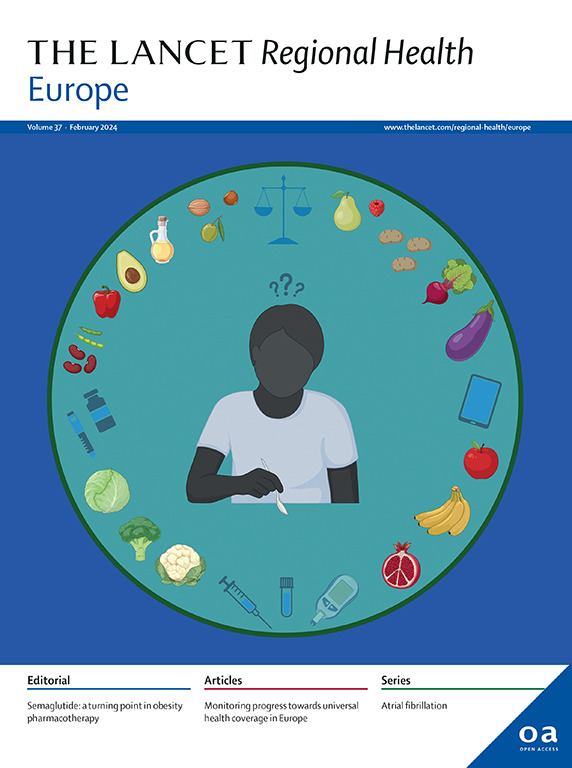186 990 名孕前接种 COVID-19 疫苗的妇女的接种情况和分娩结果:一项全英格兰范围的队列研究
IF 13.6
Q1 HEALTH CARE SCIENCES & SERVICES
引用次数: 0
摘要
背景世界卫生组织推荐在怀孕期间接种 COVID-19 疫苗是有效和安全的。然而,目前仍缺乏可靠的证据来指导有生育能力的妇女选择与未来妊娠相关的疫苗接种。在此,我们调查了怀孕前开始接种 COVID-19 疫苗与分娩结果之间的关系。方法我们分析了英格兰范围内 2021 年 5 月 25 日至 2022 年 10 月 28 日期间妊娠至少 24 周的所有孕妇的关联电子健康记录。结果基于 186,990 名妇女的数据,与开始妊娠时未接种疫苗相比,在妊娠前 12 个月内接种 COVID-19 疫苗与任何疫苗类型的极早产和极早产以及足月儿小于胎龄儿的风险较低(调整后的危险比和 95% 置信区间:0.分别为 0.74 [0.63, 0.88] 和 0.94 [0.88, 1.00]),接种 mRNA 疫苗的婴儿死产风险较低(0.72 [0.52, 1.00])。接种病毒载体疫苗而非 mRNA 疫苗的妇女孕期静脉血栓栓塞发生率较高(分别为 1.54 [1.10, 2.16] 和 1.02 [0.70, 1.50])。我们发现有证据表明,与未接种疫苗的妇女相比,首次接种COVID-19疫苗后12个月内开始妊娠的妇女,在总体上或在普通人群的特定亚群中,在考虑潜在混杂因素的情况下,不良分娩结局较少。mRNA 疫苗应优先于病毒载体疫苗,以最大限度地减少安全性问题,但如果后者是唯一的选择,则仍应优先于未接种疫苗的妊娠。与妊娠期感染SARS-CoV-2或服用激素替代疗法和口服避孕药等常用药物相比,病毒载体疫苗的静脉血栓栓塞风险要低得多。本文章由计算机程序翻译,如有差异,请以英文原文为准。
COVID-19 vaccination and birth outcomes of 186,990 women vaccinated before pregnancy: an England-wide cohort study
Background
COVID-19 vaccination in pregnancy is recommended by the World Health Organisation as effective and safe. However, there remains a lack of robust evidence to inform vaccination choices for women of childbearing potential in relation to their future pregnancies. Here we investigated the association between starting a course of COVID-19 vaccination before pregnancy and birth outcomes.
Methods
We analysed England-wide linked electronic health records for all pregnancies reaching at least 24 weeks gestation between 25th May 2021 and 28th October 2022. We estimated incidence rates and hazard ratios for birth and pregnancy outcomes by pre-pregnancy COVID-19 vaccination status.
Findings
Based on 186,990 women, compared to starting a pregnancy unvaccinated, receiving COVID-19 vaccination within 12 months before pregnancy was associated with lower risks of very and extremely preterm birth and small-for-gestational age in term babies for any vaccine type (adjusted hazard ratio and 95% confidence interval: 0.74 [0.63, 0.88] and 0.94 [0.88, 1.00], respectively), and lower stillbirth risk in those receiving an mRNA vaccine (0.72 [0.52, 1.00]). Incidence of venous thromboembolism during pregnancy was higher amongst women receiving a viral-vector, but not an mRNA vaccine (1.54 [1.10, 2.16] and 1.02 [0.70, 1.50], respectively). Results were generally consistent for different dose regimens and across sensitivity analyses.
Interpretation
We found evidence that pregnancies starting within 12 months from a first COVID-19 vaccination, compared to those in unvaccinated women, experienced fewer adverse birth outcomes, overall or in selected subgroups of the general population, accounting for potential confounders. An mRNA vaccine should be preferred to a viral-vector vaccine, to minimise safety issues, but where the latter is the only choice, it is still to be preferred to starting a pregnancy unvaccinated. The venous thromboembolism risk of the viral-vector vaccine was substantially lower compared to that attributable to SARS-CoV-2 infection in pregnancy or to commonly used medications such as hormone replacement therapy and oral contraceptives in the non-pregnant population.
Funding
UK National Institute for Health and Care Research (NIHR), UKRI Medical Research Council, UK Research and Innovation, The Alan Turing Institute, Health Data Research UK, the Department of Health and Social Care.
求助全文
通过发布文献求助,成功后即可免费获取论文全文。
去求助
来源期刊

Lancet Regional Health-Europe
Multiple-
CiteScore
19.90
自引率
1.40%
发文量
260
审稿时长
9 weeks
期刊介绍:
The Lancet Regional Health – Europe, a gold open access journal, is part of The Lancet's global effort to promote healthcare quality and accessibility worldwide. It focuses on advancing clinical practice and health policy in the European region to enhance health outcomes. The journal publishes high-quality original research advocating changes in clinical practice and health policy. It also includes reviews, commentaries, and opinion pieces on regional health topics, such as infection and disease prevention, healthy aging, and reducing health disparities.
 求助内容:
求助内容: 应助结果提醒方式:
应助结果提醒方式:


